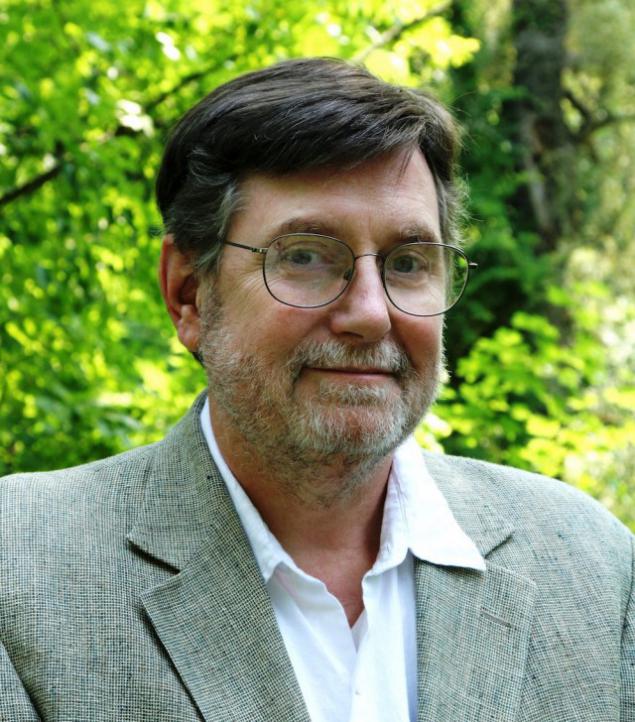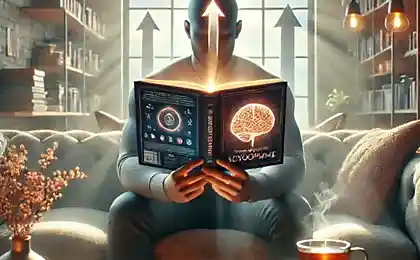605
10 facts about the habits of the bestselling book "The Psychology of bad habits"
Extensive road and short path Library Site replenishment - we read a new book by Richard O'Connor's "Psychology of bad habits" and take notes for you the most interesting facts from it.

While spaceships roam the vast expanses of the universe, bathyscaphes sink to the bottom of the Mariana Trench, and the drones are saving people and extinguish fires, neuroscience and other disciplines studying the human brain, modestly stand aside. Modern science knows little about improper functions and resources of the nervous system, behavior, emotions and mental processes.
However, progress does not stand still. Almost every day discoveries are made that shed light on one of the most enigmatic objects of scientific research - our brain.

1. Bound one tsepyuVrednye habits (eg, smoking, dependence on the Internet and gambling, procrastination, stubbornness, bad habits of sleep and appetite for risk) "present" in the brain in the literal sense - they have a physical embodiment of a neural ties.
2. See vsёEto surprisingly, modern scanners allow the details to consider not only the brain, but the processes that take place in it. Now you can evaluate the success of therapy and the effect of different track conditions. For example, people who regularly experience stress, we can see the big white gaps in the place where there should be brain tissue.
3. How important veritEsli something confirms our views and beliefs, we remember it. Conversely, we do not accept what is contrary to our values. Recent studies have shown that certain areas of the brain actually "shut down" when the people heard the information is clearly contrary to their political convictions. In contrast, when listening to information that confirms our views in the brain are activated "centers of happiness».
4. New zhiznNavernyaka you have heard that it is not necessary to be nervous and angry because the nerve cells do not regenerate. This is a myth! New cells continue to form in adults. Moreover, in the brain there are colonies of rapidly dividing stem cells able to migrate and replace any even specialized nerve cells. And it is important that they share more active when we learn.
5. Training - vsePoleznye our habits, willpower and self-control can be developed. These characteristics - not given, such as eye color. More recently, it was believed that we make a lot of childhood, and because change is either impossible or very difficult. In fact need only regular practice.
Acquire healthy habits easier if we constantly practice this, because the nerve cells develop and form together new material connection. Just say to yourself: "I will not eat sweets in the evening." Of course, at first it will be difficult. But this is temporary.
6. Brain obmanschikChtoby not injure our "I", the mind resorts to cognitive distortions - a thought-l'oeil, errors in thinking that lead to perceive the reality is not quite objectively. Instead, they protect us from disappointment and maintain self-esteem.
Common examples of cognitive distortions - the distortion in the perception of the choices made (we are confident that in the past made the right choice), the deviation in the direction of the status quo (the tendency to maintain the status quo and not to change anything), planning errors (we underestimate the time it takes for completion of the work).
7. Three months - a lot or a little? In one experiment, students were taught to juggle, while observing the operation of the brain. The test involved daily for three months. During this time, scientists have documented the growth of the gray matter of the brain. Then the students forbidden to train on the same three months. And in the end? The opposite effect! Growth stopped.
The practical value of this observation is that we should not have to demand from ourselves too much in a short period of time. For example, if we ate a lifetime 3 cakes for lunch and 2 - for dinner, then do not blame themselves when not work for six months to lose 20 kg. All the work, but not immediately.
8. Strength mysliVozmozhno, it may seem fantastic, but the brain is developing, if we practice, not only in real terms but also mentally. Harvard professor conducted experiments: one group was asked every day to play the piano, and the other - do the same thing, only in the imagination (they could not even move his fingers!). Just five days motor cortex area of the participants in both groups evolved.
This proves the fact that the brain responds perfectly and mental exercise. So auditory training - is not an idle pastime.
9. Railway in goloveLyubaya habit is represented in our brain physically as if it has its own railway siding. Paths are laid in childhood and adolescence, but whether they will be abandoned or vice versa - depends on us. The more often we turn to the habit, the stronger it is fixed.
If we too often behave in a certain way, the brain remembers it as a way to alleviate the stress. And although we know that there is a more healthy way, we are already hard to give up the old track.
10. Nothing goes besslednoProdolzhaya previous idea note: neither bad nor good habits are not lost. If we practice the opposite behavior to them, our "branch" rust and become overgrown with grass. But it does not disappear. That is why there is a chance (or risk - who is closer) to easily go back to the learned way of action or thought.
Based on the book "The Psychology of addictions»
via www.mann-ivanov-ferber.ru/books/nastrojka_mozga/

While spaceships roam the vast expanses of the universe, bathyscaphes sink to the bottom of the Mariana Trench, and the drones are saving people and extinguish fires, neuroscience and other disciplines studying the human brain, modestly stand aside. Modern science knows little about improper functions and resources of the nervous system, behavior, emotions and mental processes.
However, progress does not stand still. Almost every day discoveries are made that shed light on one of the most enigmatic objects of scientific research - our brain.

1. Bound one tsepyuVrednye habits (eg, smoking, dependence on the Internet and gambling, procrastination, stubbornness, bad habits of sleep and appetite for risk) "present" in the brain in the literal sense - they have a physical embodiment of a neural ties.
2. See vsёEto surprisingly, modern scanners allow the details to consider not only the brain, but the processes that take place in it. Now you can evaluate the success of therapy and the effect of different track conditions. For example, people who regularly experience stress, we can see the big white gaps in the place where there should be brain tissue.
3. How important veritEsli something confirms our views and beliefs, we remember it. Conversely, we do not accept what is contrary to our values. Recent studies have shown that certain areas of the brain actually "shut down" when the people heard the information is clearly contrary to their political convictions. In contrast, when listening to information that confirms our views in the brain are activated "centers of happiness».
4. New zhiznNavernyaka you have heard that it is not necessary to be nervous and angry because the nerve cells do not regenerate. This is a myth! New cells continue to form in adults. Moreover, in the brain there are colonies of rapidly dividing stem cells able to migrate and replace any even specialized nerve cells. And it is important that they share more active when we learn.
5. Training - vsePoleznye our habits, willpower and self-control can be developed. These characteristics - not given, such as eye color. More recently, it was believed that we make a lot of childhood, and because change is either impossible or very difficult. In fact need only regular practice.
Acquire healthy habits easier if we constantly practice this, because the nerve cells develop and form together new material connection. Just say to yourself: "I will not eat sweets in the evening." Of course, at first it will be difficult. But this is temporary.
6. Brain obmanschikChtoby not injure our "I", the mind resorts to cognitive distortions - a thought-l'oeil, errors in thinking that lead to perceive the reality is not quite objectively. Instead, they protect us from disappointment and maintain self-esteem.
Common examples of cognitive distortions - the distortion in the perception of the choices made (we are confident that in the past made the right choice), the deviation in the direction of the status quo (the tendency to maintain the status quo and not to change anything), planning errors (we underestimate the time it takes for completion of the work).
7. Three months - a lot or a little? In one experiment, students were taught to juggle, while observing the operation of the brain. The test involved daily for three months. During this time, scientists have documented the growth of the gray matter of the brain. Then the students forbidden to train on the same three months. And in the end? The opposite effect! Growth stopped.
The practical value of this observation is that we should not have to demand from ourselves too much in a short period of time. For example, if we ate a lifetime 3 cakes for lunch and 2 - for dinner, then do not blame themselves when not work for six months to lose 20 kg. All the work, but not immediately.
8. Strength mysliVozmozhno, it may seem fantastic, but the brain is developing, if we practice, not only in real terms but also mentally. Harvard professor conducted experiments: one group was asked every day to play the piano, and the other - do the same thing, only in the imagination (they could not even move his fingers!). Just five days motor cortex area of the participants in both groups evolved.
This proves the fact that the brain responds perfectly and mental exercise. So auditory training - is not an idle pastime.
9. Railway in goloveLyubaya habit is represented in our brain physically as if it has its own railway siding. Paths are laid in childhood and adolescence, but whether they will be abandoned or vice versa - depends on us. The more often we turn to the habit, the stronger it is fixed.
If we too often behave in a certain way, the brain remembers it as a way to alleviate the stress. And although we know that there is a more healthy way, we are already hard to give up the old track.
10. Nothing goes besslednoProdolzhaya previous idea note: neither bad nor good habits are not lost. If we practice the opposite behavior to them, our "branch" rust and become overgrown with grass. But it does not disappear. That is why there is a chance (or risk - who is closer) to easily go back to the learned way of action or thought.
Based on the book "The Psychology of addictions»
via www.mann-ivanov-ferber.ru/books/nastrojka_mozga/
"Chemistry" or "natural": the truth about modern food
How long will life on earth if the sun goes out























